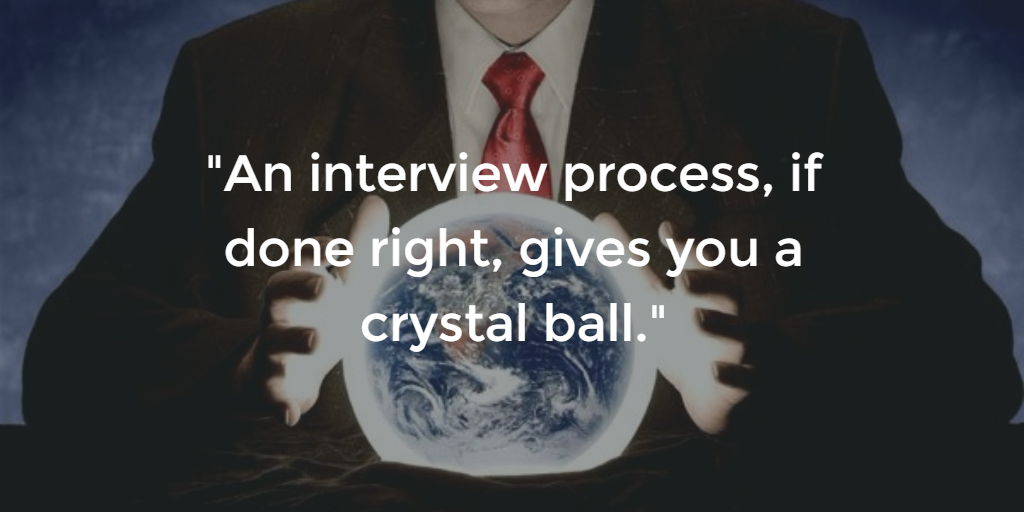What’s hard about hiring?
Recently I asked an audience, “What’s hard about hiring?”
A man in the second row frowned and waved his hand to get a microphone. “The candidates don’t come with a crystal ball. You can’t see how they are going to perform.”
When he said that, my adrenaline kicked higher. I was about to explain a method for interviewing candidates that is just like having a crystal ball.
I don’t know if what I’m about to share with you is impressive, or pathetic. I’ve committed my entire career to helping leaders improve their success rates in hiring talented teams. I’m a one-trick pony. I just love this topic, and have found it a fundamental skill that underlies the success of any leader.
First, a brief history, to earn your trust. I studied in graduate school twenty years ago with the Father of Management, Peter Drucker. He estimated that managers make hiring mistakes 50% of the time. This topic of hiring talented teams always intrigued me. My father was an industrial psychologist, so I had been around this topic for my whole life. In 1998 I finished my Ph.D. dissertation on this topic of evaluating various methods for hiring. I had read about 50 years’ worth of research, and noted some interesting findings, like “don’t ask hypothetical questions.” As it turns out, candidates give you hypothetical answers. Yet today, so many leaders pose hypothetical questions to their candidates—”How would you do this, how might you do that?”
My original dissertation research on this subject won awards, and I found myself presenting the findings in Brussels, Belgium, at a special event called the Frontiers of Entrepreneurship research conference, alongside professors from around the world. During my Ph.D. dissertation study, I found that, consistent with the field of research, there were a few key things that really worked in interviewing: 1) to a specific set of criteria in mind (scorecard), 2) to collect not a little, but a lot—hundreds of data points—on a candidate’s accomplishments and failures from their actual past experiences, and 3) then scoring candidates on a consistent set of criteria (apples to apples). These “past-oriented interviews” as I called them in my Ph.D. dissertation, were the most valid and reliable predictor of a candidate’s future performance on the job (as opposed to “future-oriented” or hypothetical interview formats). I wanted to share this important insight with the world. To give leaders a crystal ball.
An interview process, if done right, gives you a crystal ball.
For the last 20 years, my colleagues and I have used this approach to evaluate over 15,000 candidates for leadership jobs in all industries. We have taught thousands of people how to use this method for hiring—business leaders, entrepreneurs, government leaders including 3 sitting U.S. governors, and top brass in the military. It works. Clients who follow our methods achieve a 90% hiring success rate. And you can too. (Come to my SMARTfest event and I’ll teach you how!)
And it follows a very simple structure of collecting highs and lows from a candidate’s education years, then asking 5 questions about every job: What were they hired to do, what did they accomplish that they were proud of, what were mistakes in that job, who did they work with and how were they viewed, and why did they leave that job? There have been many versions of this style of interview over the years, but the simplest, and most effective format we call the Who Interview™.
This is straight out of our book Who, which has been since its publication in 2008 the #1 top-selling and most-acclaimed book on this topic in the world. And this topic, hiring talented teams, has become the #1 topic in business, if you look at any recent survey of what’s on the minds of CEOs and investors.
We want you to apply this concept to improve your hiring success rate from 50% to 90%. So that’s why we’re giving you free access to the Who Interview template. We exist to help leaders amplify their positive impact on the world. And we share our knowledge about leadership with the world. We hope you find these tools and templates useful as you hire talented teams, and that they help you achieve your business and career goals!
Download the SMARTtools for Leaders™ WHO INTERVIEW Tool.

Leave a Reply